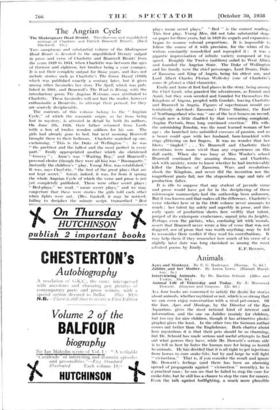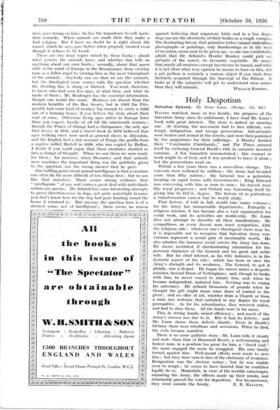Animals .
ton: 5s.) Intervielvirig Animals. By Dr. Bastian Schmid. (Allen atal i'mi in., 10s. 6d.)
Animal Life oU:Yeaterday and Today. By ;T.- Morewooa: Dowsett. (Grayson and Grayson. 12s. 6d.)
ALL four books are concerned to satisfy the .desire for stories about animals, whether mythical or nOt,witich-is.so'strong that we can even enjoy conversation with a rival pet-owner. Of the four, Apes and Monkeys, by the Director of the Zoo Aquarium, gives the ghost rational kind of interest and information, and the one on. Jubilee (mainly for children, but too coy for nice children, though it has attractive photo- graphs) gives the least. In the other two the German author - comes out better. than the Englishman. Both chatter about how mysterious it is that their pets should be so charming, but Dr. Schmid has made serious and useful -attempts to find . out what powers they have, while Mr. Dowsett's serious side is to tell us how he hates the human race for being so horrid to animals. He LUIS decided that it is all right to get injections from horses to cure snake-bite, but by and large he will fight vivisection." Tilt is, if you consider the result and ignore Mr. Dowsett's feelings (and there has been an alarming spread of propaganda against " vivisection " recently), he is a practical man ; he can see that he failed to stop the cure for snake-bite, but he still has a chance to stop the cure for cancer. Even the talk against bullfighting, a much more plausible ease, goes wrong on him ; he has the impudence to call mata- dors cowards. When animals are made idols they make a bad religion. But I have no doubt he is right about the camel, which he says goes better when properly treated even though it refuses to be loved.
-
There are two large topics raised by these books : about svhat powers the animals have, and whether this tells us anything about our own limits ; secondly, abOut that queer shift of the mind of Europe in the Renaissance, from viewing man as a fallen angel to viewing him as the most triumphant of the animals. Anybody can see that we are like animals, but the theological issue comes with the question whether the dividing line is sharp or blurred. You want, therefore, to know who had seen live apes, at what time, and what he made of them ; Mr. Boulenger has the essential information, though .one would like more.- Monkeys are absent from the modern heraldry of the Boy Scouts, but in 1303, the Fitz- geralds had some kind of monkey big enough to carry a child out of a burning house, if you believe the story about their coat of arms. Otherwise living apes arrive in Europe later than you expect, hardly at all till the nineteenth century ; though the. Prince of Orange had a chimpanzee, the ,only ape that kisses, in 1641, and a travel- book in 1670 believed that apes walking erect were used as general slaves in Abyssinia, and the English had a fairaecount of Pongo, the gorilla from a captive Called. Martell in 1698, who was copied by Buffon. I doubt if You could argue that these creatures' startled us into a change of thought. When we saw them we were ready for them ; for instance,, when Descartes said that animals were machines the important thing was the publicity given to the question, not the wrong answer that he gave. One battling point about animal intelligence is that a creature can often do the more difficult of two things first, ; but we are like that ourselves. There seems strong ' evidence that " intelligende " of any sort varies a great deal with individuals within one species. Dr. Schmid has some interesting attempts
ro
to pve direction-sense in dogs, not quite watertight because you don't kilo* how far the dog had gone hunting round the house it returned to. But anyway the question here is of a distinct sense, not of Intelligence.; there seems., no reason against believing that migratory birds and in a less degree dogs can use the electricity of their bodies as a rough compass. The fascinating theory that primitive tribes cannot understand gs photographs or paintings, only linedrawin" as in the work of cavemen, seems now to be given up; so one can comfottably admit that Dr. Schmid's Howler Monkey could pick out pictuteS—of the carrot, its favourite vegetable. He insists . that nearly all,creatutes except, insectscan be tamed, and while
n
it is not clear what rosy opinion he means to base on this, still certainly a curious objeet if yOu start a pet pYthon is ce from Instincts! acquired :through 'the. SurviVal of the, Fittest. It looks as if the scientists will get to undeistand men sooner than they will animals.
EMPSON.





















































 Previous page
Previous page